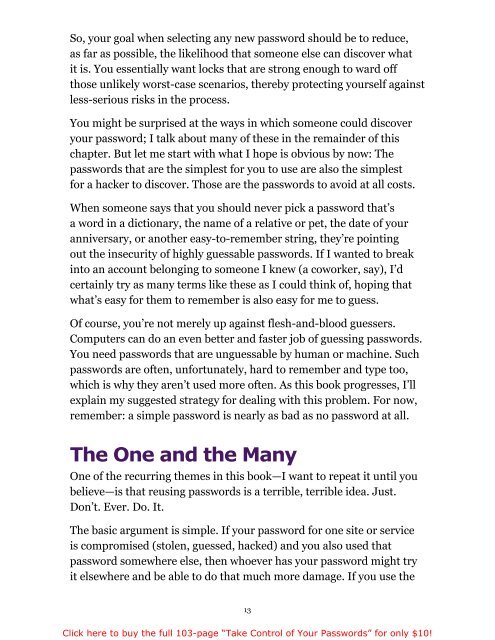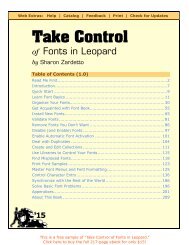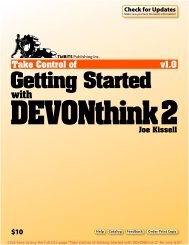Take Control of Your Passwords (1.1) SAMPLE
Take Control of Your Passwords (1.1) SAMPLE
Take Control of Your Passwords (1.1) SAMPLE
Create successful ePaper yourself
Turn your PDF publications into a flip-book with our unique Google optimized e-Paper software.
So, your goal when selecting any new password should be to reduce,<br />
as far as possible, the likelihood that someone else can discover what<br />
it is. You essentially want locks that are strong enough to ward <strong>of</strong>f<br />
those unlikely worst-case scenarios, thereby protecting yourself against<br />
less-serious risks in the process.<br />
You might be surprised at the ways in which someone could discover<br />
your password; I talk about many <strong>of</strong> these in the remainder <strong>of</strong> this<br />
chapter. But let me start with what I hope is obvious by now: The<br />
passwords that are the simplest for you to use are also the simplest<br />
for a hacker to discover. Those are the passwords to avoid at all costs.<br />
When someone says that you should never pick a password that’s<br />
a word in a dictionary, the name <strong>of</strong> a relative or pet, the date <strong>of</strong> your<br />
anniversary, or another easy-to-remember string, they’re pointing<br />
out the insecurity <strong>of</strong> highly guessable passwords. If I wanted to break<br />
into an account belonging to someone I knew (a coworker, say), I’d<br />
certainly try as many terms like these as I could think <strong>of</strong>, hoping that<br />
what’s easy for them to remember is also easy for me to guess.<br />
Of course, you’re not merely up against flesh-and-blood guessers.<br />
Computers can do an even better and faster job <strong>of</strong> guessing passwords.<br />
You need passwords that are unguessable by human or machine. Such<br />
passwords are <strong>of</strong>ten, unfortunately, hard to remember and type too,<br />
which is why they aren’t used more <strong>of</strong>ten. As this book progresses, I’ll<br />
explain my suggested strategy for dealing with this problem. For now,<br />
remember: a simple password is nearly as bad as no password at all.<br />
The One and the Many<br />
One <strong>of</strong> the recurring themes in this book—I want to repeat it until you<br />
believe—is that reusing passwords is a terrible, terrible idea. Just.<br />
Don’t. Ever. Do. It.<br />
The basic argument is simple. If your password for one site or service<br />
is compromised (stolen, guessed, hacked) and you also used that<br />
password somewhere else, then whoever has your password might try<br />
it elsewhere and be able to do that much more damage. If you use the<br />
13<br />
Click here to buy the full 103-page “<strong>Take</strong> <strong>Control</strong> <strong>of</strong> <strong>Your</strong> <strong>Passwords</strong>” for only $10!






